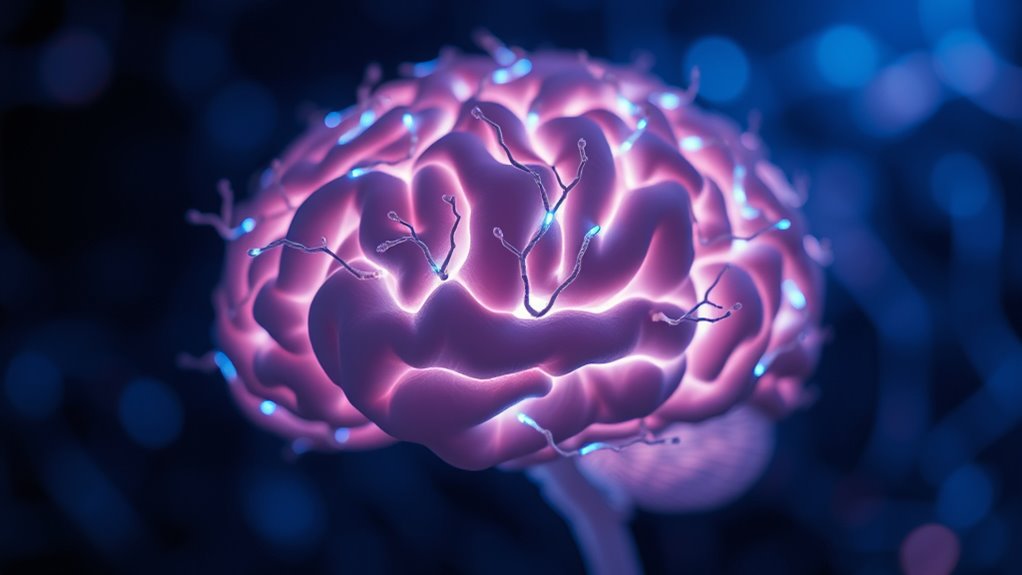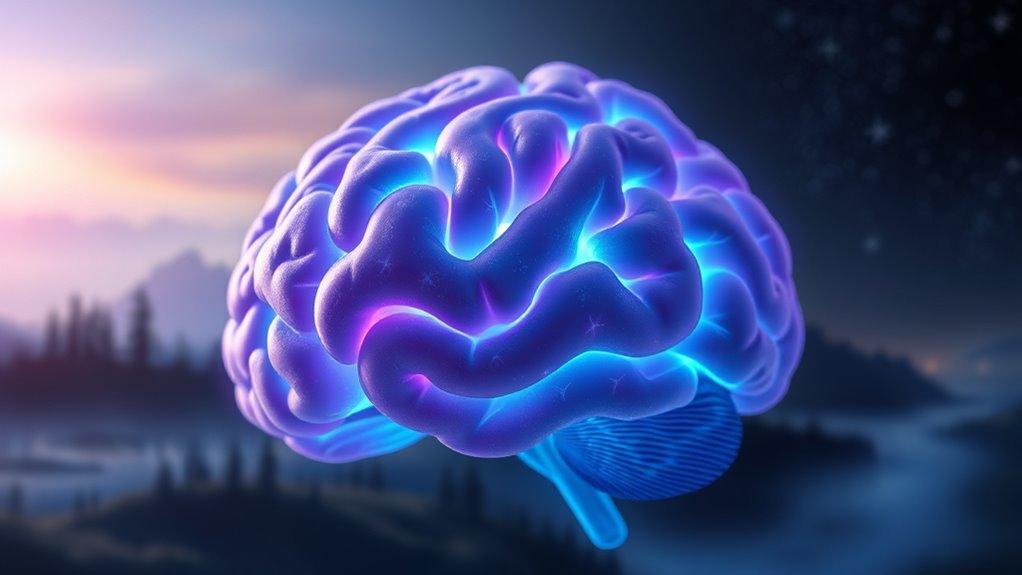The hippocampus plays a key role in turning your dreams into lasting memories by actively encoding recent experiences during sleep. It helps transfer information from short-term to long-term storage, especially during REM and lucid dreaming when neural activity reactivates memory traces. This process strengthens connections and reinforces what you’ve experienced, making memories more stable. If you want to understand how your dreams shape your memory and what happens behind the scenes, keep exploring these fascinating mechanisms.
Key Takeaways
- The hippocampus encodes new memories and transfers them to long-term storage during sleep, especially in REM phases.
- It reactivates neural patterns related to recent experiences during dreams, supporting memory consolidation.
- During lucid dreaming, hippocampal activity may increase, enhancing memory recall and deliberate processing.
- The hippocampus interacts with the neocortex to integrate and create coherent, meaningful memories from experiences.
- Disruptions in hippocampal function impair memory consolidation and recall, highlighting its vital role in dreams and memory.

Dreams and memory are deeply interconnected, shaping how you process and retain experiences. When you dream, especially during REM sleep, your brain isn’t just wandering aimlessly; it’s actively working to consolidate the memories you’ve formed throughout the day. This process, known as memory consolidation, involves transferring information from short-term to long-term storage, strengthening neural connections along the way. Lucid dreaming, where you become aware that you’re dreaming and can sometimes control the dream’s content, offers a fascinating window into this process. During lucid episodes, you might notice that your memory feels sharper or more flexible, which suggests that your brain is engaging in a more deliberate form of memory processing. This connection highlights how dreams aren’t just random mental events—they play an essential role in how your brain organizes and solidifies your experiences.
Dreams actively consolidate memories, especially during REM sleep and lucid dreams, sharpening and organizing your experiences.
The hippocampus, a small but indispensable part of your brain, sits at the heart of this process. It acts as a hub for encoding new memories and coordinating their transfer into long-term storage elsewhere in your brain. During sleep, especially in REM phases, the hippocampus reactivates the neural patterns associated with recent experiences. This reactivation helps reinforce those memories, making them more stable and accessible later on. When you have lucid dreams, you might be tapping into this hippocampal activity more consciously. Some research suggests that lucid dreaming could even foster enhanced memory consolidation because your awareness during the dream state allows you to revisit and manipulate memories more intentionally. You might recall more details or strengthen certain memories by consciously focusing on them during a lucid dream.
Moreover, the hippocampus doesn’t work alone; it interacts with other brain regions, like the neocortex, to integrate new experiences into your existing knowledge base. This integration is essential for forming coherent, meaningful memories. When you sleep well and experience healthy REM cycles, your hippocampus can perform its role effectively, leading to better memory retention. Disruptions to this process—due to sleep deprivation or neurological issues—can impair your ability to remember recent events or learn new information.
Understanding the role of the hippocampus in dreams and memory also sheds light on how prophetic dreams may involve complex neural processes that integrate subconscious information with stored memories, although their interpretation remains a blend of science and cultural beliefs. In essence, your dreams serve as a dynamic platform where memory consolidation takes place, with lucid dreaming offering a unique opportunity to observe and potentially influence this process. The hippocampus acts as the key conductor, orchestrating the transfer and strengthening of memories so that your life’s experiences aren’t lost but woven into the fabric of who you are. By understanding these mechanisms, you gain insight into how your mind transforms fleeting moments into lasting memories, all while you sleep.
Frequently Asked Questions
Can Hippocampal Damage Cause Complete Amnesia?
Hippocampal damage can cause significant memory problems, but it doesn’t usually lead to complete amnesia. You might struggle with new memory formation because hippocampal neurogenesis, the process of creating new neurons, is disrupted. This affects your ability for memory retrieval, especially for recent events. However, older memories stored outside the hippocampus often remain intact, so full amnesia is rare unless damage is extensive.
How Does Sleep Influence Hippocampal Memory Consolidation?
Sleep greatly influences hippocampal memory consolidation by enabling processes like memory replay during deep sleep stages. During this time, sleep spindles facilitate the transfer of memories from the hippocampus to the neocortex. You benefit from this process because it strengthens your memories, helping you retain information better. So, getting quality sleep with proper sleep spindles can boost your memory consolidation and overall learning capacity.
Are Hippocampal Functions Linked to Emotional Memory Processing?
When it comes to emotional memory processing, your hippocampus plays a key role, acting as the gatekeeper for emotional recall and memory encoding. It links feelings with specific events, making memories more vivid. Think of it as the brain’s emotional librarian, sorting and storing emotional experiences efficiently. This connection helps you better understand your feelings and memories, highlighting how closely your hippocampus is tied to your emotional world.
What Techniques Are Used to Study Hippocampal Activity During Dreams?
You can study hippocampal activity during dreams using neuroimaging techniques like fMRI, which visualize brain activity in real-time, or through electrophysiological recordings, such as intracranial EEG, that measure electrical signals directly from the hippocampus. These methods help you understand how the hippocampus functions during dreaming, revealing patterns of activation linked to memory consolidation and emotional processing. Combining these approaches offers a detailed view of hippocampal involvement in dreams.
Is There a Difference in Hippocampal Role Between Vivid and Vague Dreams?
Like a painter choosing colors, your hippocampus influences dream clarity and visual vividness. During vivid dreams, it actively reconstructs detailed scenes, much like a storyteller weaving rich imagery. In contrast, vague dreams see the hippocampus less engaged, resulting in hazy, less distinct scenes. So, yes, the hippocampus plays a more prominent role in creating the sharpness and clarity of vivid dreams compared to the fuzziness of vague ones.
Conclusion
So, as you dream and remember, your hippocampus works tirelessly, shaping your memories and fueling your imagination. It links your past with your dreams, creating a seamless flow of experience. It stores your stories, shapes your thoughts, and sparks your creativity. By understanding this essential role, you realize that your mind is a powerful storyteller, constantly weaving memories and dreams into the rich tapestry of your life. Embrace it, cherish it, and keep exploring the depths of your mind.










